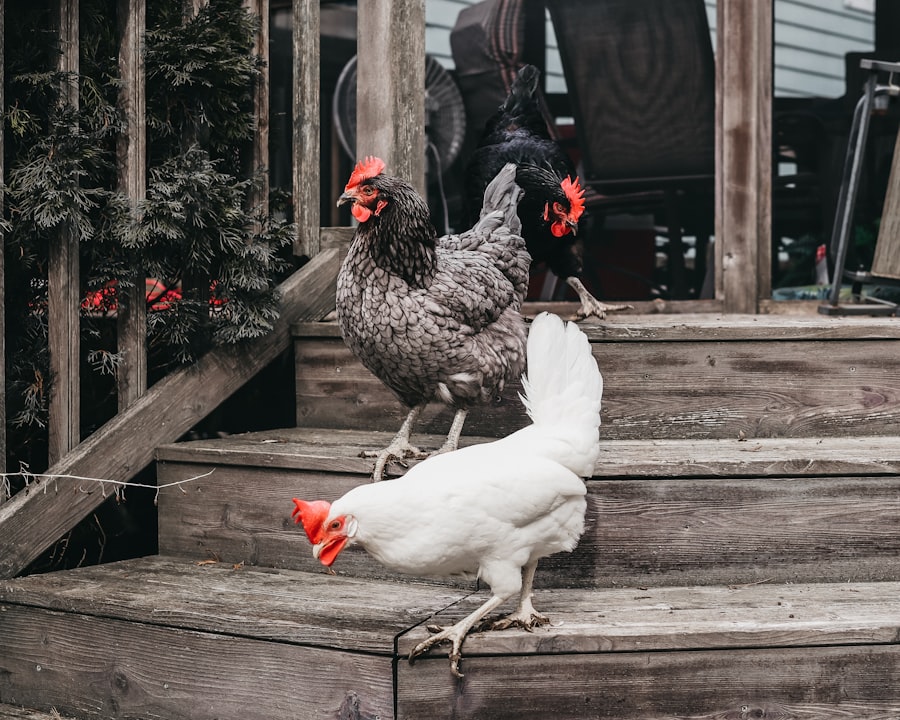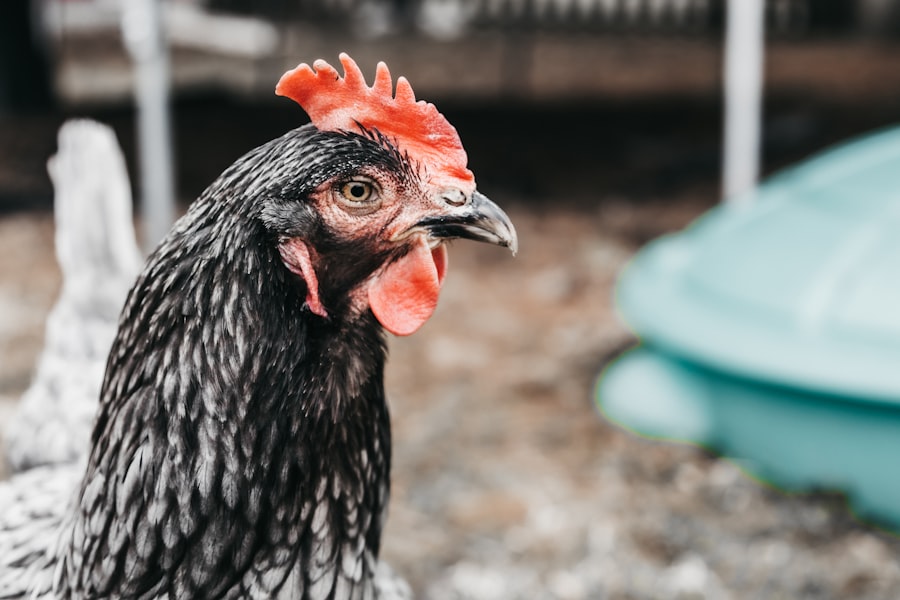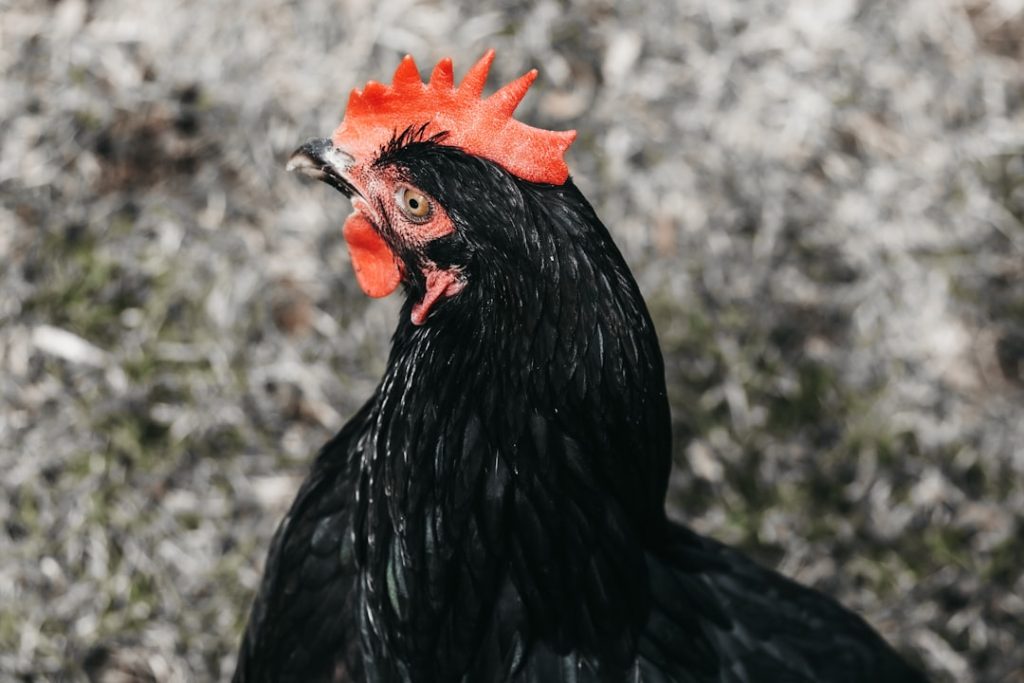Understanding chicken behavior is essential for successful chicken farming. Chickens are social creatures that thrive in flocks and establish a natural pecking order with dominant and submissive individuals. Providing adequate space is crucial to allow chickens to establish their hierarchy without overcrowding, which can lead to aggression and stress.
Chickens are also intelligent and curious, requiring mental stimulation through enrichment activities like perches, dust baths, and toys to prevent boredom-related behavior issues. Chickens have natural instincts for foraging and roosting. They spend much of their day scratching and pecking at the ground in search of insects and vegetation.
Access to a varied diet and outdoor space for foraging is vital for their well-being. Chickens also have a strong instinct to roost at night for safety, so providing secure roosting areas within the coop helps them feel safe and reduces stress and potential behavior issues. Chickens are highly sensitive to environmental changes and routine disruptions.
Sudden changes in their surroundings, such as new animals or loud noises, can cause stress and lead to behavioral problems. It is important to introduce changes gradually and observe the chickens’ responses. By understanding and respecting their natural behaviors, farmers can create an environment that promotes positive behavior and overall well-being for their flock.
Table of Contents
- 1 Creating a Secure Enclosure
- 2 Providing Adequate Food and Water
- 3 Regularly Checking Fencing and Boundaries
- 4 Training and Socializing Chickens
- 5 Using Deterrents and Barriers
- 6 Seeking Professional Help if Necessary
- 7 FAQs
- 7.1 What are some effective ways to keep chickens from wandering off?
- 7.2 What type of fencing is best for keeping chickens from wandering off?
- 7.3 How can I create a designated chicken area to prevent them from wandering off?
- 7.4 What should I do to ensure my chickens have adequate food and water to prevent them from wandering off?
- 7.5 Are there any natural deterrents I can use to keep chickens from wandering off?
Key Takeaways
- Chickens have complex social structures and communication methods, and understanding their behavior is crucial for their well-being.
- A secure enclosure with proper fencing and predator-proofing is essential to protect chickens from harm.
- Providing adequate food and water is important for the health and productivity of chickens.
- Regularly checking fencing and boundaries is necessary to ensure the safety and security of chickens.
- Training and socializing chickens can help them become more comfortable and easier to handle.
- Using deterrents and barriers can help keep predators away from chickens and their enclosure.
- Seeking professional help is necessary if there are any concerns about the health or behavior of chickens that cannot be addressed independently.
Creating a Secure Enclosure
Choosing the Right Fencing Material
The first step in creating a secure enclosure is to select the right fencing material. While chicken wire is a popular choice, it may not be sufficient to keep out determined predators such as raccoons or foxes. Consider using hardware cloth, a stronger and more secure option for enclosing your chicken coop and run.
Designing a Predator-Proof Enclosure
In addition to the fencing material, it’s essential to consider the height of the enclosure. Predators like raccoons and foxes can climb, so a fence that is at least 6 feet tall is recommended to prevent them from gaining access to your chickens. Furthermore, bury the fence at least 12 inches underground to prevent predators from digging underneath it.
Securing the Coop and Run
The design of the coop itself is also critical in creating a secure enclosure. Ensure that the coop has secure latches on all doors and windows to prevent predators from gaining access. Additionally, consider adding a predator apron around the perimeter of the coop, an outward-facing barrier that prevents predators from digging under the fence. By creating a secure enclosure with the right fencing material, adequate height, and a well-designed coop, you can help protect your chickens from predators and ensure their safety and well-being.
Providing Adequate Food and Water

Providing adequate food and water is essential for maintaining the health and well-being of your chickens. Chickens require a balanced diet that includes a mix of grains, protein, vitamins, and minerals. A commercial chicken feed that is specifically formulated for their nutritional needs is a good starting point.
Additionally, providing access to fresh grass, insects, and kitchen scraps can help supplement their diet and provide enrichment. It’s important to provide access to clean water at all times. Chickens can drink a surprising amount of water, especially during hot weather or when laying eggs.
Make sure that water containers are kept clean and free of debris to prevent the spread of disease. In addition to providing food and water, it’s important to consider the feeding and watering system you use. Automatic feeders and waterers can help ensure that your chickens have access to food and water throughout the day, even when you’re not able to be there to refill their containers.
By providing a balanced diet, access to clean water, and a reliable feeding and watering system, you can help ensure that your chickens stay healthy and happy.
Regularly Checking Fencing and Boundaries
Regularly checking fencing and boundaries is crucial for maintaining the security of your chicken enclosure. Over time, fences can become damaged or weakened, which can create opportunities for predators to gain access to your chickens. It’s important to inspect the fencing regularly for any signs of wear or damage, such as holes, rust, or loose posts.
In addition to checking the physical condition of the fencing, it’s important to regularly inspect the perimeter of the enclosure for any signs of digging or other attempts by predators to gain access. Look for signs of digging along the fence line or evidence of predators attempting to climb over the fence. It’s also important to consider the vegetation around the perimeter of the enclosure.
Overgrown bushes or trees can provide cover for predators, making it easier for them to approach the fence undetected. Regularly trimming back vegetation around the perimeter can help reduce the risk of predator attacks. By regularly checking the fencing and boundaries of your chicken enclosure, you can identify and address any potential weak points before they become a problem, helping to keep your chickens safe from predators.
Training and socializing chickens is an important aspect of chicken farming that can help prevent behavioral issues and improve the overall well-being of your flock. Chickens are intelligent animals that can be trained to respond to cues and commands. By spending time with your chickens and using positive reinforcement techniques such as treats or praise, you can teach them to come when called or to go into their coop at night.
Socializing chickens from a young age can also help prevent aggression and fearfulness. Handling chicks regularly from a young age can help them become more comfortable with human interaction, making them easier to handle as adults. Additionally, introducing new chickens to the flock gradually can help prevent aggression and establish a harmonious social dynamic within the group.
It’s also important to provide enrichment activities that encourage positive social interactions among your flock. Providing perches, dust baths, and toys can help keep chickens engaged and prevent boredom-related behavior issues. By training and socializing your chickens from a young age, you can help prevent behavioral issues and create a harmonious social dynamic within your flock.
Using Deterrents and Barriers

Startling Predators with Motion-Activated Devices
Using deterrents and barriers is a crucial aspect of predator control when it comes to safeguarding your chickens. One effective method is to employ motion-activated lights or sound devices that startle predators and deter them from approaching your coop.
Creating the Illusion of Danger with Decoys
Additionally, predator decoys such as fake owls or snakes can create the illusion of danger, discouraging predators from coming near. These decoys can be a simple yet effective way to keep predators at bay.
Physical Barriers for Added Protection
Barriers such as predator aprons or electric fencing can also be highly effective in preventing predators from gaining access to your chickens. Predator aprons are outward-facing barriers that prevent predators from digging under the fence, while electric fencing delivers a mild shock that deters predators from attempting to climb over or dig under the fence.
Regular inspection of deterrents and barriers is essential to ensure their effectiveness. Make sure to check motion-activated lights or sound devices regularly to ensure they are functioning properly, and inspect electric fencing regularly to ensure it is delivering an effective shock. By using deterrents and barriers effectively, you can help protect your chickens from predators and ensure their safety.
Seeking Professional Help if Necessary
If you are experiencing persistent behavioral issues or predator problems despite your best efforts, it may be necessary to seek professional help. A professional animal behaviorist or chicken consultant can provide valuable insight into understanding and addressing behavioral issues within your flock. They can offer guidance on training techniques, socialization strategies, and environmental enrichment activities that can help improve the well-being of your chickens.
Additionally, if you are struggling with persistent predator problems despite using deterrents and barriers, it may be necessary to consult with a professional pest control expert. They can assess your property for potential weak points in your predator control measures and offer solutions for addressing them effectively. By seeking professional help when necessary, you can gain valuable expertise in addressing behavioral issues within your flock or improving predator control measures to ensure the safety of your chickens.
In conclusion, understanding chicken behavior is crucial for successful chicken farming. Creating a secure enclosure with the right fencing material, adequate height, and a well-designed coop is essential for keeping chickens safe from predators. Providing adequate food and water, regularly checking fencing and boundaries, training and socializing chickens, using deterrents and barriers effectively, and seeking professional help when necessary are all important aspects of maintaining happy and healthy chickens on your farm or homestead.
By taking these factors into consideration and implementing best practices for chicken care, you can create an environment that promotes positive behavior and overall well-being for your flock.
If you’re looking for tips on how to keep your chickens safe and secure, you might also be interested in learning how to insulate a chicken coop. This article from Poultry Wizard provides valuable information on how to keep your chickens warm and protected during the colder months. Check it out here for some helpful advice.
FAQs
What are some effective ways to keep chickens from wandering off?
Some effective ways to keep chickens from wandering off include using fencing, creating a designated chicken area, providing adequate food and water, and using deterrents such as motion-activated sprinklers.
What type of fencing is best for keeping chickens from wandering off?
A sturdy and secure fencing such as chicken wire or hardware cloth is best for keeping chickens from wandering off. Make sure the fencing is buried underground to prevent predators from digging underneath.
How can I create a designated chicken area to prevent them from wandering off?
You can create a designated chicken area by using fencing to enclose a specific area for the chickens to roam. This can be a permanent enclosure or a movable chicken tractor.
What should I do to ensure my chickens have adequate food and water to prevent them from wandering off?
Make sure to provide your chickens with a constant supply of fresh water and a balanced diet of chicken feed. This will help keep them content and less likely to wander off in search of food and water.
Are there any natural deterrents I can use to keep chickens from wandering off?
Yes, you can use natural deterrents such as planting thorny bushes or using motion-activated sprinklers to discourage chickens from wandering off into unwanted areas.
Meet Walter, the feathered-friend fanatic of Florida! Nestled in the sunshine state, Walter struts through life with his feathered companions, clucking his way to happiness. With a coop that’s fancier than a five-star hotel, he’s the Don Juan of the chicken world. When he’s not teaching his hens to do the cha-cha, you’ll find him in a heated debate with his prized rooster, Sir Clucks-a-Lot. Walter’s poultry passion is no yolk; he’s the sunny-side-up guy you never knew you needed in your flock of friends!







